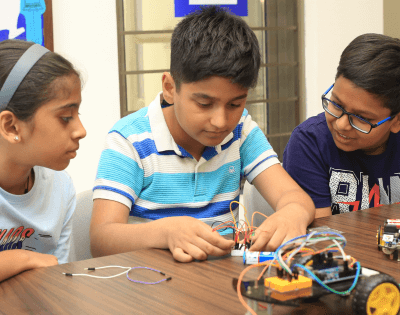
As a child, what did you do in your free time?
Children are innately curious by birth and that’s why you always find them experimenting with objects around the house.
One of the ways to help them maintain this curiosity is by teaching them to learn through observation. When they spot the changes in seasons, see a plant grow, and observe the different patterns of nature, they tread a pathof knowledge that transcends book learning.[1] It fuels their curiosity and gives them more to experiment with. This is what science is also all about – watching, thinking, and experimenting.
As a parent, there are many things you can do at home to develop an interest in science and make it exciting f[2] or your child. Here are some of them:
1. Teach concepts through experimentation
From creating baking soda volcanoes in the kitchen to powering up a bulb with a potato, science experiments can be quite fun and insightful for both the parent and the child.
Escape the ordinary and try out a unique experiment – suck an egg into a glass bottle and insert a piece of burning paper. Just as the smoke from it starts to reach the brim of the bottle, place a hard-boiled egg (narrow-side down) at the mouth. It will slowly and eventually get sucked into the bottle.
You can use this experiment to explain how air expands and contracts due to heat and cold. They will easily be able to understand how a vacuum is created, which then sucks the egg in.
2. Promote learning via observation
Children learn from observation. Gardening can be a great way for them to use their observation skills and learn about plant growth.
Let them sow a seed in the soil and click a picture. Ask them to observe it daily and click a picture the moment they see a change. They will slowly see the seed germinate and its roots start to develop.
When children will click pictures at each stage, they will be able to draw the growth cycle of a plant. Ultimately, they will want to learn more about the different ways in which plants grow and reproduce
3. Organise visits to online museums
Remember when you first saw ‘Jurassic Park’? The movie spiked an interest in the existence of dinosaurs. Suddenly, we wanted to know more about how the earth was when there were no humans on it. While movies can sometimes be a great source of information, more often than not, they fail to reveal the exact details about the subject.
You can always introduce your child to a dinosaur or age-appropriate archaeological themed movie and let them ask you questions. Once you see them getting interested, book a virtual tour of a museum (there are many free ones too!).
Museums are great places to visit with children and help them gain knowledge about the world. When they see a huge dinosaur skeleton, questions like, “Did they really exist?”, “What did they eat?”, and “What caused them to go extinct?” come to their mind. You can help fuel their interest in different subjects by sharing more information with them.
4. Push your child to think
Children often learn from their adults. Ask your child observation-based questions, the answers to which cannot be found in their books.
For instance, ask them “Why is the sky blue and not violet?” Let them scout for the answers and have them ask their teachers at school too. Push them to be seekers. This way, their mind will be able to think from a fresh perspective, and before you know it, they will have their own set of questions to boggle your mind with.
Some interesting questions which you can have conversations with your child are:
- How was the distance between the earth and the sun measured?
- Why is there no light in space?
- How do I open the lid of a tight container without using physical power?
Conclusion
Science is not as difficult as most people perceive it to be. It is a logical subject that involves using observation and problem-solving skills to learn how the world works. In fact, if you really get into it, it can be rather fun to learn and understand science.
The above tips will help you create a comfortable learning environment for your child at home. Push them to ask questions. The more they ask, the more they’ll learn.
At The Blue Bells, we employ unique teaching [5] methodologies to help children develop an interest in science. The school houses ample learning spaces that encourage intellectual stimulation and creativity. Concepts are made tangible through multiple sensory and cognitive experiences. In this way, our students develop a knack for learning.




